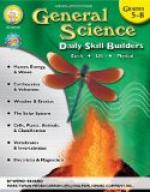41. Cause of Mouth Breathing. Some people find it difficult to breathe through the nostrils on account of growths, called adenoids, in the nose. If you have a tendency toward mouth breathing, let a physician examine your nose and throat.
Adenoids not only obstruct breathing and weaken the whole system through lack of adequate air, but they also press upon the blood vessels and nerves of the head and interfere with normal brain development. Moreover, they interfere in many cases with the hearing, and in general hinder activity and growth. The removal of adenoids is simple, and carries with it only temporary pain and no danger. Some physicians claim that the growths disappear in later years, but even if that is true, the physical and mental development of earlier years is lost, and the person is backward in the struggle for life and achievement.
[Illustration: FIG. 23.—Intelligent expression is often lacking in children with adenoid growths.]
42. How to Build a Fire. Substances differ greatly as to the ease with which they may be made to burn or, in technical terms, with which they may be made to unite with oxygen. For this reason, we put light materials, like shavings, chips, and paper, on the grate, twisting the latter and arranging it so that air (oxygen in the air) can reach a large surface; upon this we place small sticks of wood, piling them across each other so as to allow entrance for the oxygen; and finally upon this we place our hard wood or coal.
The coal and the large sticks cannot be kindled with a match, but the paper and shavings can, and these in burning will heat the large sticks until they take fire and in turn kindle the coal.
43. Spontaneous Combustion. We often hear of fires “starting themselves,” and sometimes the statement is true. If a pile of oily rags is allowed to stand for a time, the oily matter will begin to combine slowly with oxygen and as a result will give off heat. The heat thus given off is at first insufficient to kindle a fire; but as the heat is retained and accumulated, the temperature rises, and finally the kindling point is reached and the whole mass bursts into flames. For safety’s sake, all oily cloths should be burned or kept in metal vessels.
44. The Treatment of Burns. In spite of great caution, burns from fires, steam, or hot water do sometimes occur, and it is well to know how to relieve the suffering caused by them and how to treat the injury in order to insure rapid healing.
Burns are dangerous because they destroy skin and thus open up an entrance into the body for disease germs, and in addition because they lay bare nerve tissue which thereby becomes irritated and causes a shock to the entire system.
In mild burns, where the skin is not broken but is merely reddened, an application of moist baking soda brings immediate relief. If this substance is not available, flour paste, lard, sweet oil, or vaseline may be used.




